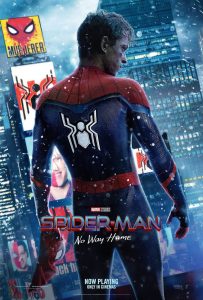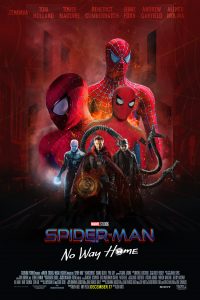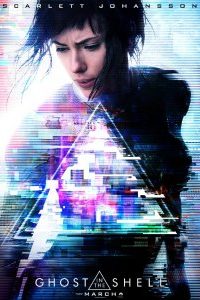Into the Metaverse: Josh Pearce and Arley Sorg Discuss Spider-Man: No Way Home
 There are always a number of film reviewers who plaster their reviews with quotable hyperbole, regardless of the quality of the film itself. Perhaps because they want to keep getting free movie tickets. Or perhaps because they hope to see their quote floating over an action snippet in a TV commercial.
There are always a number of film reviewers who plaster their reviews with quotable hyperbole, regardless of the quality of the film itself. Perhaps because they want to keep getting free movie tickets. Or perhaps because they hope to see their quote floating over an action snippet in a TV commercial.
In the case of Spider-Man: No Way Home, you can believe the hype.
Peter Parker’s secret identity as web-slinging superhero Spider-Man (Tom Holland) has been revealed, and there are consequences. He decides his best option is to elicit the aid of Doctor Strange (Benedict Cumberbatch), in the hopes that Strange has some kind of magical fix which can undo the reveal. Parker, being boyishly-charming-but-sometimes-annoying to people like Strange, distracts the sorcerer and interrupts the spell, causing unforeseen and dangerous complications.
Hidden between the lines of this basic plot description are details which demonstrate how this movie rises above most movies of its kind. Anyone who reads comic books knows that the most predictable and overused consequence of a secret identity reveal is putting loved ones in danger. And, yes, there’s some of this. But the consequences in this film also include interesting story elements which are far less trite, yet still improve the story by being meaningful to characters and relevant to the plot. The distraction part — okay, sure, it’s a bit heavy-handed, but it happens early in the film and gets everything in motion, so it gets a pass. Especially since the unforeseen and dangerous complications are just so damn fun! In other words, this team of filmmakers took what could have been a pretty boring, standard superhero movie, and made something truly entertaining.
Some of the fun in this movie is in the surprises, and the surprises are worth being surprised by. We recommend avoiding spoilers (if that’s still possible). Our spoilery content will be after the “spoiler break.”
Arley: This is probably the first major Marvel movie that felt like a comic book, that really embodied the vibe, the buoyancy – especially great with a Spider-Man title. I didn’t watch previews really, so a lot of this is because I was pleasantly surprised. But when I think about it, I pretty much liked everything about this movie. Which is rare for me to say about Marvel movies these days.
Josh: Yeah. I think we’ve said before that these Spider-Man movies capture the fun feeling more than any other Marvel movie recently. I love this movie. I came out of it thinking it’s probably my favorite Marvel movie right now. I like the whole trilogy, and this was a pretty good conclusion to it. It had a pretty epic scope, for being a Spider-Man movie. It is basically a live-action Into the Spider-Verse but that was fine with me. I would be really happy if all Marvel movies from now on were just this extended Spider-Man cinematic universe. All versions of all Spidermen everywhere. [Both laughing]
Josh: The audience was having a blast. We had a very involved audience around us.
Arley: This is a good movie for that.
Josh: It was! People were cheering at everything, yelling at everything. People behind me were like, oh shit, it’s this dude, and this kid was like, I don’t know who that is, and his mom’s explaining it to him. It was an interactive thing, an entire experience. It’s not my favorite movie of the year, because I think The Green Knight still held onto that, but it was close.
All of the elements you could want in a comic book movie come together to deliver a fantastic film. Tom Holland makes a great Parker/Spider-Man, Zendaya serves up excellence as MJ, and Jacob Batalon delivers that balance of heart and humor as best friend Ned Leeds. Marisa Tomei shows off her range and depth as May Parker, her role in the narrative shifting again and again as the plot progresses. Even the villains are better than usual, doing what they do.
When it comes to the intersection of action and special effects, so many movies are heavily reliant on CGI — such as Godzilla vs. Kong; or for that matter, the bulk of superhero movies — resulting in moments of disconnection for the audience. The experience can be similar to watching a video game, or anime. It’s just too obvious that it’s digital-on-digital violence, which dampens the sense of stakes. Those films rely upon “cool” moments in place of emotional investment, often resulting in fairly boring content. Spider-Man: No Way Home proves that it’s possible to blend those “cool” visuals with emotionally engaging action, effectively raising the bar for the action film industry.
Arley: I think one of the things that makes Spider-Man, and in particular this Spider-Man, stand out in terms of the comics and the Marvel Cinematic Universe, is that when Spider-Man’s in a fight, you’re worried for him, you feel like he’s getting hurt. Like, when Iron Man’s in a fight, it’s just CGI against CGI. You’re not really worried for him. And when something happens to him, you kinda intellectually go, okay but he’s gonna be fine. Even when he died, I don’t know about you but for me I was like, eh. Deuces.
Josh: After a point, they’ve kinda run their course. You’re like, it’s fine.
Arley: Most superhero movies, especially Superman or something, it’s two supermen fighting each other, there’s no sense of connection to actual pain or struggle and the conclusion feels inevitable. But when Spider-Man’s in a fight, you’re like – he’s just a kid! Wait – Don’t! Don’t pick him up by the leg and swing him into things! That’s fucked up! That’s one of the things I like about the character, he’s not this, “I’m just gonna pick up a mountain and throw it at you” type of character. His power is limited. He could get shot and die, and he’s fucking around, swinging around, messing with people. I think this lends strength to the narrative. It makes it so you can become more involved – in the character, the plot, the action. The action has higher stakes, because, even if he’s gonna win the fight somehow, he’s gonna get hurt. For this movie in particular, the action is so dynamic, so engaging. I think Spidey as a character lends himself more to that – not like the Hulk, whose body movements are more limited. Spider-Man is a physically fluid character.
Josh: Two things I really liked about this movie. One was: they were all incredibly intelligent, and were using science to solve their problems…
Arley: [laughing] I knew you would love that!
Josh: I mean, at some level, it’s kind of “pop science.” It’s like Star Trek: Discovery science, “the power of math!” Not actual science, but it’s fine. At least the characters weren’t like, “We have to shoot the problem!” Violence wasn’t always the solution, and at the end, it wasn’t the typical CGI punching each other in the face resolution.
Arley: Yeah, not people just punching each other until someone falls down.
Josh: There were people punching each other, but that wasn’t the point, that wasn’t the goal, it was just a consequence of what was happening. And the point where they went fourth wall or meta, and they’re like, “Isn’t comic-book logic stupid?” I thought it was so great that they were doing their own commentary about the borderline of absurdity that they have to ride — I was like, thank you for that, because I basically make that complaint for every Marvel movie that we review, you know?
Arley: [grins] Yes. You do.
Josh: But I’m not going to here. At the start of the story I was wishing that the whole movie wasn’t premised on magic, but then they addressed it, completely. Did we talk about this with the other Spider-Man movies? How at the end of the first Spider-Man movie, there were all these questions. Then in the next movie, they directly answered all those questions. I love this series. They’re actually closing their loops.
Arley: This movie had so many levels of Easter eggs, and conversations, both with comic books and prior movies. You could watch this without having seen the other Spider-Man movies, and you could enjoy it. And if you have seen the other Spider-Man movies, and remember stuff from them, you’re rewarded for having seen them. If you’re a comic book reader, there are little bits here and there to delight you. There are different levels of rewards for everybody, which is really smart.
Josh: That’s a good point, that you can watch it without having to.
Even the writing is good in this movie. Side characters were developed but not distracting, having their own mini-arcs and goals, everything fitting in smoothly to the bigger picture. Moments of darkness and action were balanced by humor and lightness and heart. Unlike the overbearing grittiness of works like the recent Justice League movies, struggles feel important to the characters, not to mention somehow relatable, and the overall narrative is tempered by triumph. Also unlike the aforementioned Justice League movies, the filmmakers here never forget that this is, at the end of the day, a comic book. For those folks who spent hours reading comic books and finding joy in it? This is your movie.
Arley: This movie demonstrates that sequels can be done well. This movie proves that sequels can fucking rock.
Josh: I think this was the strongest of the trilogy.
Obviously, we are recommending this film. It’s great fun. We had a lot to say about it, but this is where we get spoilery. If you haven’t seen it yet, and if spoilers bother you, stop reading and buy your tickets. Even if spoilers don’t bother you… it’s a strong film, you’ll still enjoy it, but you’ll probably enjoy it a bit more if you don’t know everything that’s coming.
-Spoiler Line-
Arley: Something I always complain about with superhero movies is that it’s so focused on a single enemy. In the comic books they have tons of enemies, and I always want to see more enemies showcased in the films. A quick fight here, a skirmish there. It doesn’t have to go into lengthy background and character development. You can show all these cool characters really quickly. Show the heroes saving people and stopping bank robberies and then get back into the main story. I loved that this was chock full of enemies, it was so satisfying!
Yes, true believers! They dug into the vault for this film, to wonderful effect. Let’s go back to that earlier plot description. When Spidey annoys Doctor Strange into messing up a (predictably) tricky spell, it tears holes in the fabric of space-time. Due to the wording of the spell — and, along with the tradition of comic book logic, this is something you probably don’t want to examine too deeply — individuals who know Spidey’s identity start getting pulled from their own Earth into the Tom-Holland-as-Spider-Man Earth. This means villains like Alfred Molina’s Doctor Octopus show up, and more!
Josh: They showed Green Goblin flying around, and I was like, oh, which Green Goblin is this? There are so many options! Is it going to be that Martin-Shkreli-looking-fucker, who I hate, is it going to be James Franco – I hope it’s not James Franco. And it’s Willem Dafoe, I was like, YES! The movie did a really good job of taking stuff that I shouldn’t have any real fondness or nostalgia for and making me actually like it. It’s really skilled; I mean, it’s also really manipulative — it’s all nostalgia, like we were talking about with Matrix Resurrections — but I liked it. I was able to view it as a comic book movie and just detach from the analytical part, and just be like, that was fun, I enjoyed it. It was a lot of humor but it wasn’t all just humor. There were sad moments, there were triumphant moments, I was feeling all the emotions all the time!
I don’t really care about the Sam Raimi Spider-Man movies that much. I know the first one was fun, and they were the first kind of really well-done Marvel superhero movies. But I don’t think I would go back and watch them. And I hated the Andrew Garfield ones. I can never decide if I like Andrew Garfield or hate him. I found myself caring about Tobey Maguire briefly, and actually enjoying Andrew Garfield’s screen presence, mostly, which is a pretty big feat. They bring in two other Spidermen, and you don’t know what their fate’s going to be, so when Tobey Maguire gets stabbed you’re like oh shit! Spider-Man is gonna die!
Arley: Yeah you’re like – daaamn!
Josh: Nobody was really safe, the story could have gone anywhere, which is kind of nice. You don’t have that Marvel forecasting to know that they have four more movies planned with some of these characters or anything.
Arley: They took the story to so many places that were unusual for superhero movies, but which still made sense.
Josh: The goal was to save these villains, and for each villain, they had a different thing they had to do. It was problem solving to redeem people. That’s fantastic. We should do way more of these stories.
Arley: And Green Goblin’s like fuck you, I like who I am!
Josh: Yeah, there’s so much betrayal, you don’t know who’s on whose side — I was so confused, it was great.
Arley: They also had these sneaky little moments of redemption, things that some fans will spot. Like the scene which is set up to mirror when Spider-Man accidentally snaps Gwen’s back. You could watch this thing over and over and be delighted by all the little treasures you find.
Josh: They took a big risk. The fact that all the setup was already done way before allowed them to take a big risk, like hey, we’re going to pull all this stuff from two different franchises, really, and try to make everything make sense. I don’t think they’d be able to do it if Into the Spider-Verse hadn’t done it first, that primed the audience for the idea of multiple Spider-Man stories converging. And this is paving the way for Marvel to do multiverse everything forever and ever.
Arley: In the comics they’ve had multiverse stories for a long time, as well as stories in the reaches of space, and so on. For me it’s nothing new. But I hate the origin story superhero movies, I want them to skip ahead. We all know who Spider-Man is, just dunk us right in and get to the point. This movie felt more like that: we get that you already know the set-up, let’s get right to it.
Josh: I love how they kept bringing up how Jamie Foxx fell into a vat of eels.
Arley: I love how Jamie Foxx was like, huh, I thought you’d be Black! And then he’s like – there’s probably a Black Spider-Man out there….
Josh: There were so many fantastic one-liners. I thought Jamie Foxx actually did a good job. Not that his acting was bad in the last one, but his character was so ridiculous in it. They redeemed that character’s… not arc, but just the fact that he exists. He was one of the more interesting characters this time around. They retconned it to fix many of the mistakes of the previous movies.
Arley: Maybe they learned from their mistakes. And they did better.
Josh: They did way better. I know this is a Marvel movie, but it had a Sony stamp on it at the end, heavily Sony credits, which is interesting because, if you look at the differences between the Spider-Man franchises – who gets all the credit for this one? If you’re using all the Sony characters, then Sony gets hella credit for it? Plus Sony made Into the Spider-Verse. It’s like, taking all of Sony’s hard work, and then putting a Marvel/Disney shine on it. But I think all the hard work was really Sony on this one.
Arley: Is there anything that didn’t work for you?
Josh: I think the magic at the beginning…
Arley: Because it’s magic.
Josh: Well, yeah. I mean, I get that it’s Doctor Strange and his magic is like quantum bullshit…
Arley: In the comics it’s just magic. It’s just plain, straight up magic. It’s not quantum anything.
Josh: Okay. Well then, yeah. I think the fact that they had to rely on Doctor Strange for the premise in order to set up his next movie — that’s really the only reason he’s in there. That’s the part I liked the least. But Into the Spider-Verse did it with a particle accelerator. So you know you can do it without magic, but they had to do it with Doctor Strange. That kind of annoys me that another movie dictates the terms of the movie you’re watching, without being necessary.
But Into the Spider-Verse did it with a particle accelerator. So you know you can do it without magic, but they had to do it with Doctor Strange. That kind of annoys me that another movie dictates the terms of the movie you’re watching, without being necessary.
Arley: I do love an actual team-up, like, a real, legit Doctor Strange team up would have been cool. I used to eat it up when characters would appear in each other’s titles, and I devoured Team-Up comics. But this wasn’t an actual team-up. It’s like, Strange is very functional, not really helping to fight the enemies or to solve a problem. Also, I am fundamentally annoyed by superhero movies where the problem is caused by the superheroes themselves, which is basically the idea here. It undermines the idea and purpose of superheroes being around. I want to see them helping with problems they didn’t initiate or cause. But this has become a standard of a lot of superhero movies. It dumps all over the idea that this person is trying to use their powers for good.
Josh: At least it wasn’t what I dislike the most, which is, the superhero is just fighting a villain version of themselves. This was visually different and in the end fight everyone is doing different things.
Arley: So what are your top things you liked?
Josh: The meta-aspect really worked for me. I think these movies work best when they acknowledge their own flaws as translations of comic books onto the screen. Deadpool did the same thing. Tom Holland is great in these roles; the whole cast was great, but he does such a good Spider-Man. The fact that they were problem solving at the end, rather than just solving with violence. And the issue was interesting: mental health. They didn’t slow down too much to delve into the issue, but it was there and it was interesting.
Arley: I liked a lot of the action. I felt my body react to it — it was tense, I was into it, which doesn’t happen with most superhero movies. And I liked a lot of the writing. I used to stay up really late reading comic books and feeling happy about it, and this movie really captured that feeling. It’s good-natured, good-hearted fun, even if it dips into darker aspects.
Josh: I went with someone who had never seen the Andrew Garfield ones, but she still really liked this one. Nothing was missing.
If you’re new to these movies or you’ve seen and read everything, you’re probably going to really enjoy this one. Highly recommended by both of us. Go watch it and have fun!
Directed by: Jon Watts
Written by: Chris McKenna, Eric Sommers, Stan Lee (based on the Marvel comic book by), Steve Ditko (based on the Marvel comic book by)
Starring: Tom Holland, Zendaya, Benedict Cumberbatch, Jacob Batalon, Jon Favreau, Jamie Foxx, Willem Dafoe, Alfred Molina, Benedict Wong, Tony Revolori, Marisa Tomei, Andrew Garfield, Tobey McGuire

ARLEY SORG, Senior Editor, has been part of the Locus crew since 2014. Arley is a 2021 World Fantasy Award finalist for his work as co-Editor-in-Chief at Fantasy Magazine. He is also Associate Editor and reviewer at Lightspeed & Nightmare magazines, columnist for The Magazine of Fantasy and Science Fiction, and interviewer at Clarkesworld Magazine. He grew up in England, Hawaii, and Colorado, and lives in Oakland, CA. A 2014 Odyssey Writing Workshop graduate, he can be found at arleysorg.com – where he has started his own “casual interview” series with authors and editors – and on Twitter (@arleysorg).
JOSH PEARCE has stories and poetry in Analog, Asimov’s, Beneath Ceaseless Skies, Cast of Wonders, Clarkesworld, IGMS, Nature, and more. Find him on Twitter: @fictionaljosh, or at fictionaljosh.com. One time, Ken Jennings signed his chest.
 While you are here, please take a moment to support Locus with a one-time or recurring donation. We rely on reader donations to keep the magazine and site going, and would like to keep the site paywall free, but WE NEED YOUR FINANCIAL SUPPORT to continue quality coverage of the science fiction and fantasy field.
While you are here, please take a moment to support Locus with a one-time or recurring donation. We rely on reader donations to keep the magazine and site going, and would like to keep the site paywall free, but WE NEED YOUR FINANCIAL SUPPORT to continue quality coverage of the science fiction and fantasy field.
©Locus Magazine. Copyrighted material may not be republished without permission of LSFF.







